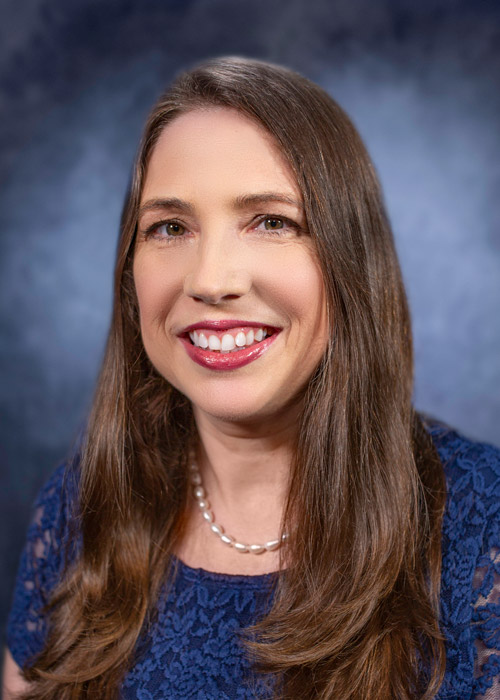UTD Planetary Scientist Dr. Mary Urquhart
Named to NASA Mars Education Panel
Team to Develop Lesson Plans Tied to Current Rover Missions
RICHARDSON, Texas (Jan. 22, 2004) — A planetary scientist at The University of Texas at Dallas (UTD) has been selected to serve on a National Aeronautics and Space Administration (NASA) team that will develop lesson plans on the Internet for elementary and secondary school students based on ongoing discoveries being made by the space agency’s Mars Exploration Rovers.

Dr. Mary L. Urquhart, an assistant professor of science education and physics and member of UTD’s William B. Hanson Center for Space Sciences, will join a handful of classroom teachers, scientists and educators from throughout the country on the education panel.
The curriculum development effort, known as RoverQuest, seeks to kindle interest among students in the exploration of Mars and science in general by offering youngsters a chance to participate in the process of scientific discovery.
“In my experience working with students from preschool to graduate school, Mars exploration is a topic that is inherently exciting,” said Urquhart. “The RoverQuest team will leverage the excitement of an opportunity to participate in real, ongoing Mars exploration to further student interest in learning more about their own world, as well as mathematics and technology.”
According to Urquhart, each lesson plan created by the team will allow students to utilize real data in their studies from the Mars Exploration Rover landing sites almost as soon as it becomes available to scientists. The plans will be posted on a NASA web site, which teachers will be able to access.
One NASA rover, named Spirit, successfully landed on the surface of the Red Planet on Jan. 3 and has been beaming back spectacular photos and other data since. A second rover, Opportunity, is scheduled to land at another location on Mars on Jan. 24.
The twin rovers provide “an opportunity we’ve never had before,” Urquhart said. “These rovers are in a very real sense robotic geologists, capable of exploring regions on Mars that have raised many interesting questions — particularly about mineralogy — when seen from orbit.”
Since the normal mission span for each rover is only 90 days, Urquhart and her colleagues must move quickly to develop their lesson plans.
“The time frame will be short, making this a much more challenging undertaking than would be normal in curriculum development,” Urquhart said. “While we would like to have as much as possible for students and teachers to use available while the data is still coming in, I am sure that many of the activities will be usable long after both of the rovers have ceased to function.”
The lessons will vary in complexity and scope and be designed to appeal to a wide range of students, Urquhart said, from upper-level elementary school students to those in high school. Because each lesson will be based on national science and technology standards, it will be designed to integrate easily with existing curricular requirements, thus enhancing standard instruction, she said.
Urquhart has performed other educational outreach and curriculum development duties for NASA, including creating a science lesson for grades five through eight in conjunction with the Mars Microprobe Mission in 1999, while she was a postdoctoral researcher at the space agency’s Jet Propulsion Laboratory at the California Institute of Technology. Later, she partnered with her mother, Sally Urquhart, a chemistry teacher at Lake Highlands High School in Dallas, to adapt the lesson for use in high school chemistry classes.
“By providing a way for students to actively participate in the process of scientific discovery, we hope to help young people understand that science isn’t something that is found in books or that only an elite few are capable of doing,” Urquhart said. “Science is a dynamic, exciting and interesting field. Most importantly, science is for everyone.”
The NASA team plans to conduct its first meeting, which will convene online, soon.
Urquhart is currently involved in other Mars-related projects, as well. She is performing education and public outreach duties for two upcoming NASA missions to the planet — the 2005 Mars Reconnaissance Orbiter and the 2007 Mars Scout Phoenix Lander. In addition, she will be presenting a workshop on Jan. 31 for area teachers on using Mars exploration in the classroom at the Metroplex Area Conference for the Advancement of Science Teaching.
About UTD
The University of Texas at Dallas, located at the convergence of Richardson, Plano and Dallas in the heart of the complex of major multinational technology corporations known as the Telecom Corridor®, enrolls about 13,700 students. The school’s freshman class traditionally stands at the forefront of Texas state universities in terms of average SAT scores. The university offers a broad assortment of bachelor’s, master’s and doctoral degree programs. For additional information about UTD, please visit the university’s web site at www.utdallas.edu.